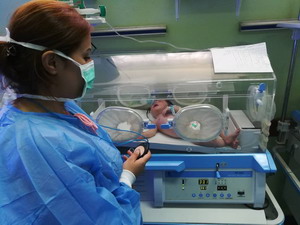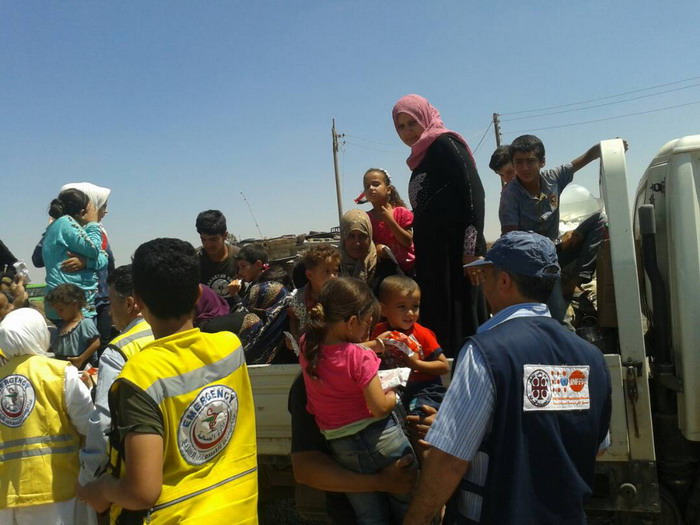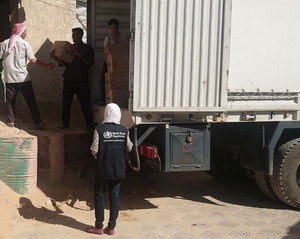WHO launches the caring for the newborn at home initiative in Syria
 Training on clinical signs during the programme at Zaid Ash-Shariti Hospital in As-Sweida governorate © WHO Syria 201825 July 2018 – Childirth is often filled with uncertainty, especially for women living in conflict-affected or insecure environments. WHO has launched a new programme to help Syrian mothers during their pregnancy and after birth to manage this life-changing event.
Training on clinical signs during the programme at Zaid Ash-Shariti Hospital in As-Sweida governorate © WHO Syria 201825 July 2018 – Childirth is often filled with uncertainty, especially for women living in conflict-affected or insecure environments. WHO has launched a new programme to help Syrian mothers during their pregnancy and after birth to manage this life-changing event.
The “caring for the newborn at home” initiative guides all mothers on the steps they and their families can take to ensure their newborn children have a healthy start in life.
Under the new programme, WHO-trained community health workers will make home visits to help mothers during pregnancy and after childbirth. To begin with, the programme is being introduced in areas that are newly reconciled, or where there is limited access to health care. It aims to reach 10 000 beneficiaries per year.
WHO concerned about access to health services for displaced people in southern Syria
 Photo: United Nations Population Fund12 July, 2018 – The World Health Organization (WHO) today called for the protection of health facilities and increased access to southern Syria, where the recent hostilities have left over 210 000 people displaced and in need of urgent health services. Up to 160 000 displaced Syrians currently seeking safety in Quneitra are inaccessible to health partners, raising concerns for their health.
Photo: United Nations Population Fund12 July, 2018 – The World Health Organization (WHO) today called for the protection of health facilities and increased access to southern Syria, where the recent hostilities have left over 210 000 people displaced and in need of urgent health services. Up to 160 000 displaced Syrians currently seeking safety in Quneitra are inaccessible to health partners, raising concerns for their health.
“People in Dar’a and Quneitra are waiting for the humanitarian community to reach them with urgently needed aid and we cannot let them down. Access must be granted,” said Dr Michel Thieren, WHO’s Regional Emergencies Director. “We call on all parties to open the door to people in southern Syria and allow the safe delivery of medicines and medical items they need, and to grant severely injured patients safe passage to hospitals outside the area that can save their lives.”
WHO delivers over 17 tons of life-saving medicines and medical equipment to the newly accessible city of Douma
 A WHO shipment reaches Douma in east Ghouta and is offloaded7 July 2018 – On 1 July 2018, the World Health Organization (WHO) delivered over 17 tons of life-saving medicines and medical equipment to the newly accessible city of Douma in eastern Ghouta in Rural Damascus.
A WHO shipment reaches Douma in east Ghouta and is offloaded7 July 2018 – On 1 July 2018, the World Health Organization (WHO) delivered over 17 tons of life-saving medicines and medical equipment to the newly accessible city of Douma in eastern Ghouta in Rural Damascus.
The WHO supplies, dispatched as part of an inter-agency humanitarian convoy, are sufficient for more than 26 000 treatments for ill and wounded patients, and will be distributed to health care facilities supported by the Directorate of Health and the Syrian Arab Red Crescent. They include essential and chronic disease medicines, nutritional supplements, trauma and burn kits, mobile and fixed X-ray and ultrasound machines, laboratory supplies and operating theatre and surgical equipment.
WHO health supplies reach southern Syria as needs grow amid increased fighting
28 June 2018, Amman, Jordan -- Opposition-controlled areas in southern Syria are witnessing a dramatic increase in violence that has led to high levels of insecurity and the displacement of tens of thousands of people. Over 80% of the estimated 525 000 people living in these areas are expected to need humanitarian assistance as a result of the fighting. This includes up to 50 000 people who have displaced over the past two weeks.
On 27 June, WHO’s office in Damascus dispatched over 27 tons of medical supplies to respond to urgent humanitarian health needs in southern Syria. Items include operating tables, intravenous fluids, antibiotics and trauma supplies, burn medications and emergency health kits. The supplies are sufficient to provide 135 000 treatments. Further supplies have been prepositioned to respond to the rapidly evolving situation.
Health care facilities in southern Syria can also draw on regular cross-border stocks delivered by WHO and health partners in Amman. Current stocks are enough to treat up to 300 000 people for three months. WHO and its partners in Amman plan to pre-position another 51 tons of emergency supplies in warehouses throughout the area, ready for dispatch to health care facilities in southern Syria as and when needed.


